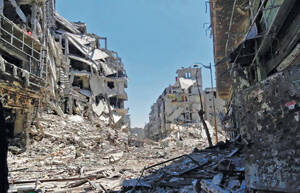The fall of the Bashar al-Assad regime in Syria is weeks away, but could be accelerated with more support from the Obama administration, said George Netto, a member of the Foreign Relations Committee of the opposition Syrian National Council and the group’s U.N. liaison.
Netto expressed gratitude for the Obama administration’s diplomatic efforts on behalf of the Syrian resistance, now battling Syrian army forces in Aleppo, Damascus and other cities, and for the U.S. role in delivering medical supplies and other nonlethal aid to Syrian refugees escaping the conflict in Turkey. But Netto wondered why the United States and other international powers, which had firmly defended the citizens of Benghazi when Libyan strongman Col. Muammar al-Qaddafi threatened its population, now seem incapable of similarly defending the embattled residents of the ancient city of Aleppo, home to one of Syria’s largest Christian communities.
“It’s not enough for the State Department to say, ‘Our hearts are with the people of Aleppo,’” he said. “It’s not enough to sit by and be sympathetic.” Netto called for the United States to issue a warning that the bombing of civilians in Aleppo would cross a line. Even just the threat of a no-fly zone, he said, “will go a long way to protect civilians.”
Netto also argued that the United States should revisit its policy on arms shipments to the Free Syrian Army. Netto said the F.S.A. controlled enough territory within Syria, particularly near the border with Turkey, to make aid delivery feasible. He complained that U.S. opposition to military aid had discouraged Turkey and Saudi Arabia from transferring weapons to rebel fighters, essentially leaving them at the mercy of the vastly superior Syrian Army.
“This is being portrayed as a civil war between two armies, but it’s not really like that,” Netto said. The volunteers of the Free Syrian Army, he explained, are loosely organized and lightly armed, attempting to defend what began as a nonviolent protest against the Assad regime—and now their families, friends and neighbors—against a modern army that has shown willingness to use heavy weapons, tanks and aircraft without discrimination.
Although more than 200,000 people have fled, most of Aleppo’s two million residents remain trapped in the city. Densely populated neighborhoods are being targeted in a bombardment so intense the wounded and dead are being left to lie in the streets, according to Netto. “The fear of a massacre is not exaggerated,” he said.
“There is a big likelihood that the regime will drive the F.S.A. out” of Aleppo, he said, “but that is not going to change anything.” Netto said the regime’s escalating brutality was only eroding what support it had left among Syria’s Alawite minority.
According to Netto, a member of the Syrian Orthodox Church, many Syrian Christians, who may have reluctantly supported the regime as at least a protector of religious minorities in Syria, are joining the resistance because of the Syrian army’s tactics. Netto downplayed concerns that Christians and Alawites face repression or worse at the hands of the Syrian opposition. “There are Christians among the underground leaders,” he said, “and there are brigades of Christians among the fighters” of the F.S.A.
He said the opposition, with the help of the United States and other Western powers, has been preparing for months to assume control of Syria if the Assad government collapses, including plans for rebuilding, economic reforms and a new constitution that will protect religious and minority rights. He said the opposition was also working on procedures for “transitional justice.”
“This is very important to us; we want to avoid blind revenge,” he said. “Those who committed crimes need to be punished,” Netto said, but the process must be controlled and just.








